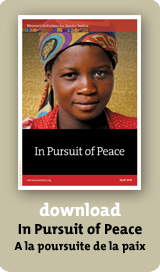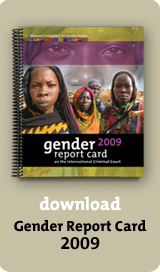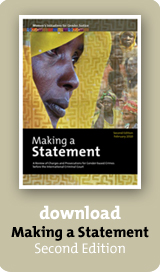E-letter August 2010 |
||
 |
||
In this issue |
Dear Friends,Welcome to a special issue of Women's Voices on the Women's Court, an event organised by the Women's Initiatives for Gender Justice and held on 1 June 2010, during the International Criminal Court (ICC) 10-year Review Conference in Kampala, Uganda. In this issue we provide you with an overview of the Women's Court, highlights from the presentations and testimonies, and a link to a selection of testimonies presented at the Women's Court. In 2011 we will publish the full text of all the testimonies along with related speeches and photos. In addition to Women's Voices, we also produce a regular legal newsletter, Legal Eye on the ICC, with summaries and gender analysis of legal developments, judicial decisions, announcements of arrest warrants and victims' participation before the Court, particularly as these issues relate to the prosecution of gender-based crimes. With both online e-letters we will also update you about the programmes, legal and political advocacy, campaigns, events, and publications of the Women's Initiatives. More information about the work of Women's Initiatives for Gender Justice and previous issues of Women's Voices and the Legal Eye can be found on our website at www.iccwomen.org. The Women's CourtFrom 31 May – 11 June, the Women's Initiatives for Gender Justice participated in the Review Conference of the Rome Statute of the ICC, in Kampala, Uganda. The Women's Initiatives team, the largest NGO delegation, included 35 women's rights and peace activists from Uganda, Central African Republic and the Democratic Republic of the Congo. Unfortunately, the Sudanese activists invited to participate in the delegation and give testimony at the Women's Court had to cancel their participation at the last minute due to serious concerns for their security following threatening statements made by the Government of Sudan in relation to the ICC Review Conference. It was reported that Dr Qutbi Al-Mahdi, ruling National Congress Party official, said that the attendance of opposition parties at the conference in Uganda 'is a provocation to the feelings of the Sudanese and disregard to their self-esteem, dignity and pride in their national sovereignty'. The day before our partners were due to travel to Kampala, three Sudanese activists in Khartoum were forcibly removed by members of the Sudanese National Security from the plane that was bringing them to Kampala to attend the Review Conference. Testimonies from Sudan were nonetheless included in the Women's Court thanks to the participation of Sudanese women's and human rights activists already on-site in Kampala. Click here to read more about Women's Initiatives participation in the Review Conference in the July 2010 issue of Women's Voices. The Women's Court featured presentations from women's rights and peace activists from Uganda, the Central African Republic, the Democratic Republic of the Congo, and Sudan, who spoke about the impact of these conflicts on women, the targeting of women by armed forces and militia groups for crimes of sexual violence and their work for justice, accountability and peace. Testimonies were given in four sessions, each focusing on a specific conflict and country where the ICC is conducting investigations. The panels were moderated by peace and justice advocates including Nobel Peace Laureate Wangari Maathai; Silvana Arbia, Registrar of the ICC; Bukeni Waruzi, Lead Campaign for Gender-based violence at Witness; and Elisabeth Rehn, Chairperson for the Board of Directors for the ICC Trust Fund for Victims. Judge Sang-Hyun Song, President of the International Criminal Court, also attended the event and delivered some remarks recognising the important and effective contributions that women's advocates made towards including gender provisions in the Rome Statute and affirming that 'the Court and the ASP must continue to build on and live up to the legacy [women] have created' and to 'take care to listen to the voices and concerns of women and of organisations like the Women's Initiatives'. The Women's Court followed in the footsteps of the 1993 Vienna Tribunal on Women's Human Rights and the 2000 Tokyo Women's Tribunal. These tribunals, with their compelling testimony by women victims/survivors of armed conflict, helped pave the way for international tribunals to prosecute gender-based crimes as international crimes. Like its predecessors, the aim of the Women's Court was to draw attention to the harms that women and girls experience during armed conflict and the fact that crimes against women continue to be under-investigated and prosecuted. Rather than making a determination of guilt or delivering a formal 'judgment', the purpose of the Women's Court was to ensure that the voices and experiences of victims/survivors — and especially women — assumed an appropriately central role at the Review Conference. Timed to precede the Assembly of States Parties' stocktaking process scheduled for the first week of the Review Conference, the Women's Court provided a forum for victims/survivors and women's rights advocates to express their views on the four stocktaking themes (the impact of the Rome Statute system on victims and affected communities, peace and justice, complementarity and cooperation). The presenters shared their views about the impact of armed conflict on women, their desire for accountability for perpetrators of gender-based crimes, their hope in the ICC to deliver on its promise of justice, and the specific challenges they face in their work for peace, justice and reconciliation. While affirming the importance of the ICC as a mechanism for accountability, they also expressed frustration over the delay in trials, the failure of governments to execute arrests and cooperate in other ways with the Court, and lack of information about the Court's role in bringing justice and peace. Below you can read excerpts from the presentations. An informal translation of French excerpts is provided in the footnotes. You can read the Advance Collection of Women's Testimonies from the Women's Court by clicking here or on the names of the presenters whose testimony is included in the Advance Collection. Quotes from presenters and testimoniesDemocratic Republic of CongoEmérite Mongelwa Tabisha, Action des Femmes pour le Développement 'Pendant les guerres, la femme reste le bouclier communautaire, et pilier du tissu socio-économique après les guerres. Lors des processus de paix, la femme congolaise est toujours exclue dans les assises de prise de grandes décisions, or elle est la plus victime des conséquences des guerres et conservatrices des valeurs communautaires. Sa place dans l'espace des assises des grandes décisions de recherche de paix n'est pas encore effectivement reconnue.'[1] Claudine Bela Badeaza, Parlons SIDA: 'La CPI est, à ce jour, la seule institution judiciaire internationale pouvant contourner certaines difficultés que connaissent nos juridictions nationales en matiére de répression des crimes graves comme le génocide, le crime de guerre, le crime contre l'humanité. Nous avons donc besoin de la voir travailler correctement, dans le but de réprimer sévèrement les auteurs des crimes cités ci-haut, de rétablir la dignité des victimes et, de ce fait, lutter contre toute forme d'impunité. Nous avons besoin de sentir l'impact de la CPI sur les victimes et les communautés affectées par les conflits armés perpétrés par la LRA dans notre Province ! En tant qu'acteurs et actrices de la société civile, nous devons coûte que coûte parler de la CPI et de son travail dans nos milieux de vie. Nous devons mettre la CPI au centre de nos conversations, et aussi aider notre Gouvernement à collaborer étroitement avec elle.'[2] DRC Presentation No 3[3] 'Nous femmes menacées d'extermination, au regard des pratiques cruelles, inhumaines et dégradantes qu'elles souffrent aux mains d'hommes en armes opérant en maître et sans inquiétude, comme sur une terre sans propriétaire, nous avons pleuré, lancé des cris d'alarmes, envoyé des SOS à toutes les autorités locales, nationales, à la communauté internationale et pays du monde entier mais jusqu'à ce jour, la situation demeure inchangée, ce qui porte à croire que notre situation laisse indifférent.'[4] Central African RepublicLewis Alexis Mbolinani, Jeunesse Unie pour l'Environnement et le Développement Communautaire 'On recommande : de mettre une synergie sous régionale d'intervention afin d'arrêter Joseph Kony et tous ses associés; qu'une justice internationale rigoureuse soit faite; de mener une étude approfondie sur les conséquences de la LRA sur les femmes, les enfants et les communautés de base; que les victimes obtiennent réparations.'[5] UgandaJane Akwero Odwong, Greater North Women Voices for Peace Network, Concerned Women's Organisation for Peace and Development 'It is imperative that Ugandan prosecutions of crimes committed should be conducted with the same standards as the Rome Statute, the highest standards of international law. The domestic process should include the Elements of Crimes and the Rules of Procedure and Evidence used at the ICC. There is urgency to create the special court to supplement the ICC within Uganda, but we expect the special court to be independent, impartial and effective.' Rosalba Oywa, Founding member of People's Voice for Peace 'Women want to be included in the formulation of any justice mechanisms and not to [just] be treated as victims or survivors, which is the practice now. The participation of victims and survivors is imperative for the formulation of positive outcomes for those same groups.' Lily Apio Odongkara, Member of the Greater North Women Voices for Peace Network: 'Although the ICC has been in existence for almost ten years, the affected communities and the survivors in Uganda know very little, if anything at all, about the Court. If you take the trouble to find out from the communities what the ICC is and what they do, only a fraction of the elite will be able to give scanty facts about them. The vast majority of the rural community who have borne the heaviest brunt of this insurgency knows very little about the work of the ICC.' SudanAmira Khair, Programme Officer, Women's Initiatives for Gender Justice 'Women are fighting to see an end to impunity and would like to witness prosecution of the perpetrators at different levels. Meanwhile they expect that considerable measures will be taken for their protection. Women will not support any peace agreement that does not include accountability.' Liema Abubkar, Journalist for Human Rights[6] 'Freedom of expression and media are restricted in Sudan, by law, domestication of newspapers, detention of journalists and restrictions on the licence of practising journalism. Electronic media are completely controlled by the government and are not accessible to many groups. Within this environment, human rights violations and the Darfur crisis have been obscured by the media and issues like the ICC are taboo. Any one supporting, reporting or highlighting ICC work can be subject to detention or harassment.' Amir Suliman, Human Rights Activist 'The practice proves that justice organs require rape victims to prove the offence with the same conditions required for proving adultery. That means they are requested to bring four male witnesses who saw the crime. This condition is extremely difficult to fulfil, especially in areas of conflicts like Darfur where this crime is committed on a widespread basis. The issue that is more astonishing is the fact that when a woman who is a victim of rape fails to find four witnesses she finds herself transformed into a suspect of adultery, particularly if there are signs of pregnancy, and she is punished with flogging if she is not married or sentenced to stoning if she is married.' Footnotes1 'During war, the woman acts as a shield for the community, and as a pillar of the socio-economic fabric when the war ends. Despite suffering the most from the consequences of the conflicts and being the repository of the values of her community, during the peace processes the Congolese woman is always excluded from the assemblies where the important decisions are made. Her position within the spaces where the big decisions on the search for peace are taken has yet to be effectively recognised.'
2 'The ICC is as of now the only international juridical institution that can get around certain difficulties faced by our national jurisdictions in relation to the repression of serious crimes such as genocide, war crimes and crimes against humanity. Therefore we need to see it working properly with the objective of seriously repressing the perpetrators of the aforementioned crimes, of re-establishing victims' dignity and so fighting against any form of impunity. We need to feel the impact of the ICC on the victims and communities affected by the armed conflicts carried out by the LRA (Lord's Resistance Army) in our Province! In our role as civil society actors, we need, at all costs, to talk about the ICC and its activities within our communities. We need to bring the ICC to the centre of our conversations and help our government to closely cooperate with it.' 3 The presenter expressed the wish to remain anonymous due to security concerns. 4 'Threatened with extermination, in light of the cruel, inhumane and degrading practices perpetrated by armed men operating in total command and with no concerns, as if on a land without owners, we have cried, launched calls for help, sent SOS messages to all the local and national authorities, to the international communities and to countries all over the world, but up to now the situation remains unchanged and this makes us think that there is an indifference to our appeals.' 5 'We recommend: putting in place a sub-regional collaborative intervention in order to arrest Joseph Kony and his partners; that rigorous, international justice is realised; carrying out an in-depth study on the consequences of LRA's activities on women, children and communities; that victims receive reparations.' 6 Liema Abubkar was not able to join the delegation in Kampala due to concerns for her security, but she provided us with her written testimony for the Women's Court. |
|||
Women's Initiatives for Gender Justice • Anna Paulownastraat 103 • 2518 BC The Hague • The Netherlands Tel +31 (0)70 302 9911 • Fax +31 (0)70 392 5270 • info@iccwomen.org • www.iccwomen.org |
||||



